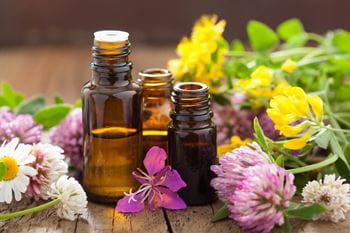There are often two camps when it comes to essential oils: those who love them and use them all the time, and those who don’t believe the hype and don’t give them a chance. As with most things, essential oils can be beneficial when used in moderation and with your doctor’s blessing.
What are essential oils?
Essential oils are fragrant extracts of the “essence” of a plant, usually taken from parts like:
- Leaves
- Stems
- Seeds
- Flowers
- Roots
- Fruit
- Bark
Think of them as a super-concentrated form of the oils naturally found in certain plants.
Uses for essential oils
Various plant oils have been used for thousands of years for a wide variety of purposes, and current uses number in the hundreds, at least! Some of the most popular reasons people give for using essential oils include:
- Antimicrobial uses, including on the skin, in the intestines and even on hard or material surfaces
- Migraine treatment and prevention
- Treatment for depression and anxiety
- Boosting the immune system and fighting inflammation
- Digestive health
- Increased energy
- Improved brain function
- Antioxidant and free radical-fighting properties (read: cancer-fighting)
- Hormone-balancing effects
- Pain relief
- Improved skin, nail and hair health
- Wound healing
- Better sleep
Precautions
If you’re interested in learning more about essential oils and how they might benefit your health, keep in mind the following:
Talk to your doc. Some essential oils could interact with certain medications. In addition, some oils may not be safe for certain groups of people (like expectant or lactating mothers, small children and the elderly).
Read labels. Check for additives that could be harmful, especially if you’re planning to swallow the product or apply it to your skin.
Know where it goes. Certain oils that are meant to be eaten, like cumin, may cause blisters if applied to your skin. Eucalyptus oil is soothing when breathed in or rubbed onto the skin, but it could cause seizures if swallowed.
Try it out. After speaking with your physician, test a small amount, whether the oil is edible or topical, to see if you have an allergic or other unpleasant reaction. Don’t use essential oils on damaged skin and stop use immediately if you develop symptoms like shortness of breath or hives, bumps, rash or other skin reactions.
Keep it fresh. About three years is the maximum shelf life of most oils; after that, you could experience skin irritation or other unwanted effects. A good rule of thumb is if it looks, feels or smells different than it used to, throw it out.




